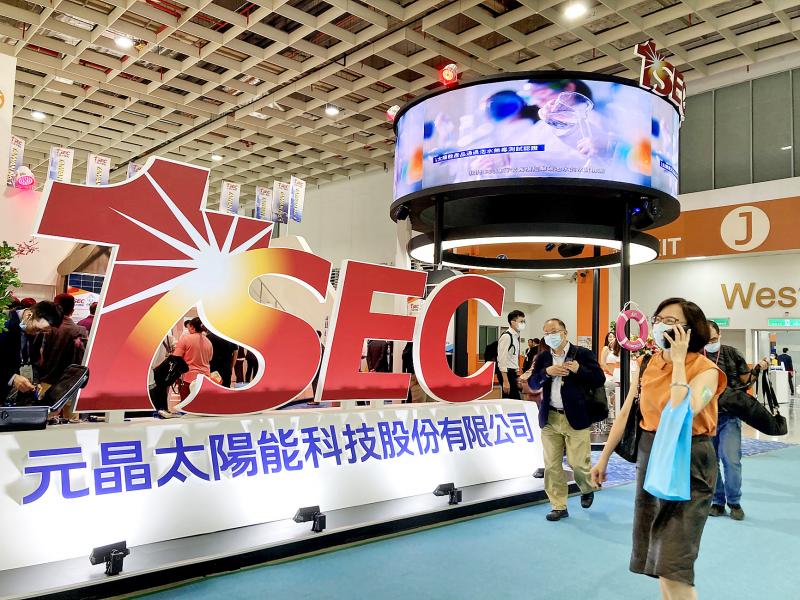United Renewable Energy Co (URE, 聯合再生能源), the nation’s biggest solar module supplier, yesterday said that demand has picked up rapidly this quarter, primarily from the home market.
Lockdowns worldwide due to the COVID-19 pandemic hindered demand and slowed solar panel installations in the first half of the year, but demand bounced back strongly after businesses reopened last quarter, URE said.
“We are optimistic about the fourth quarter, as customers are racing to install solar panels by the end of this year to match the government’s efforts to boost solar energy installations,” said a company official, who asked not to be named as they are not the company’s spokesperson.

Photo: Lisa Wang, Taipei Times
The growth momentum is driven by pent-up demand primarily from local clients, URE said.
Resilient domestic demand has boosted revenue contribution from the home market to 50 percent, compared with 30 percent last year, the official said.
Recovering demand drove factory utilization to almost 100 percent, URE chief executive officer Pan Wen-whe (潘文輝) told reporters on Tuesday, adding that the company eked out a profit last quarter, snapping six quarters of losses.
Solar panel installations in Taiwan have lagged far behind government targets due to the pandemic and other factors, including a U-turn in government policy, former TrendForce Corp (集邦科技) solar industry analyst Sharen Chen (陳君盈) told a solar energy forum yesterday.
The Bureau of Energy aims to install 2.3 gigawatts of solar panels by the end of this year, which is part of the government’s greater renewable energy policy through 2025.
The government expects solar energy nationwide to reach 20 gigawatts by 2025, Chen said.
However, he forecast that solar panel installations this year would only reach 1.2 gigawatts.
Chen said he cut his estimate for this year after the Council of Agriculture backtracked on a policy of releasing idled farmland for ground-mount solar farms.
She did not provide comparative figures.
Separately, TSEC Corp (元晶太陽能) yesterday also reported a strong rebound in demand, with good order visibility through the first quarter of next year, after securing big orders, such as Taiwan Power Co’s (台電) 100-megawatt project at the Changhua Coastal Industrial Park (彰濱工業區).
Factory utilization has reached 90 percent, TSEC said.
To cope with rising demand, TSEC’s board of directors last month approved a proposal to spend NT$626.29 million (US$21.63 million) on a new solar cell module capacity expansion plan.
TSEC’s net profit last month surged 241.45 percent year-on-year to NT$46.64 million, or NT$0.12 per share, it said in a filing with the Taiwan Stock Exchange on Tuesday.

Taiwan’s long-term economic competitiveness will hinge not only on national champions like Taiwan Semiconductor Manufacturing Co. (TSMC, 台積電) but also on the widespread adoption of artificial intelligence (AI) and other emerging technologies, a US-based scholar has said. At a lecture in Taipei on Tuesday, Jeffrey Ding, assistant professor of political science at the George Washington University and author of "Technology and the Rise of Great Powers," argued that historical experience shows that general-purpose technologies (GPTs) — such as electricity, computers and now AI — shape long-term economic advantages through their diffusion across the broader economy. "What really matters is not who pioneers

In a high-security Shenzhen laboratory, Chinese scientists have built what Washington has spent years trying to prevent: a prototype of a machine capable of producing the cutting-edge semiconductor chips that power artificial intelligence (AI), smartphones and weapons central to Western military dominance, Reuters has learned. Completed early this year and undergoing testing, the prototype fills nearly an entire factory floor. It was built by a team of former engineers from Dutch semiconductor giant ASML who reverse-engineered the company’s extreme ultraviolet lithography (EUV) machines, according to two people with knowledge of the project. EUV machines sit at the heart of a technological Cold

TAIWAN VALUE CHAIN: Foxtron is to fully own Luxgen following the transaction and it plans to launch a new electric model, the Foxtron Bria, in Taiwan next year Yulon Motor Co (裕隆汽車) yesterday said that its board of directors approved the disposal of its electric vehicle (EV) unit, Luxgen Motor Co (納智捷汽車), to Foxtron Vehicle Technologies Co (鴻華先進) for NT$787.6 million (US$24.98 million). Foxtron, a half-half joint venture between Yulon affiliate Hua-Chuang Automobile Information Technical Center Co (華創車電) and Hon Hai Precision Industry Co (鴻海精密), expects to wrap up the deal in the first quarter of next year. Foxtron would fully own Luxgen following the transaction, including five car distributing companies, outlets and all employees. The deal is subject to the approval of the Fair Trade Commission, Foxtron said. “Foxtron will be

INFLATION CONSIDERATION: The BOJ governor said that it would ‘keep making appropriate decisions’ and would adjust depending on the economy and prices The Bank of Japan (BOJ) yesterday raised its benchmark interest rate to the highest in 30 years and said more increases are in the pipeline if conditions allow, in a sign of growing conviction that it can attain the stable inflation target it has pursued for more than a decade. Bank of Japan Governor Kazuo Ueda’s policy board increased the rate by 0.2 percentage points to 0.75 percent, in a unanimous decision, the bank said in a statement. The central bank cited the rising likelihood of its economic outlook being realized. The rate change was expected by all 50 economists surveyed by Bloomberg. The